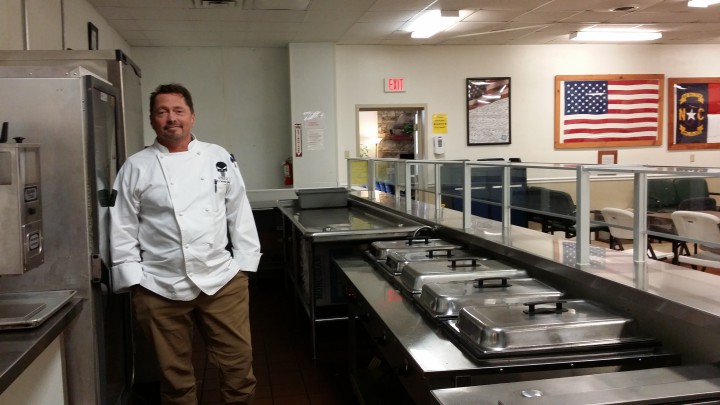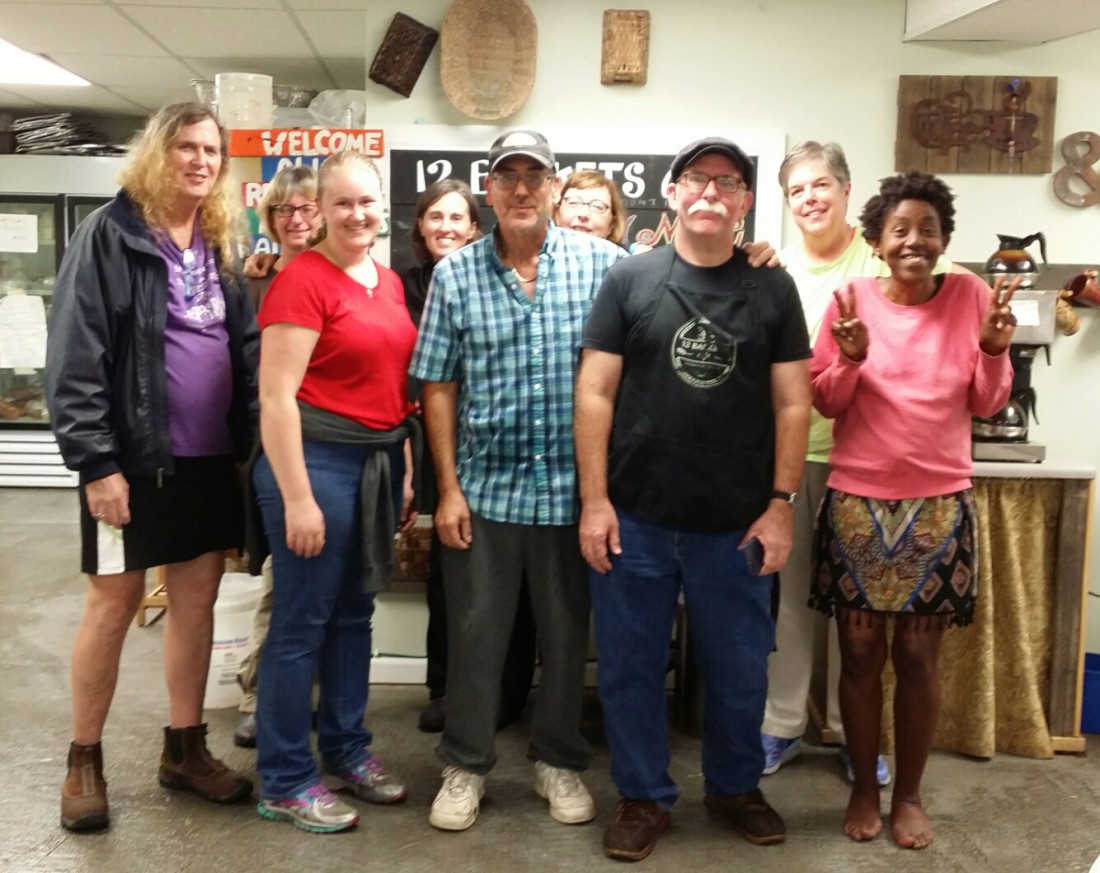It’s a busy time for the food charities of Western North Carolina. As the holiday season draws near, local organizations are mobilizing to serve the homeless, the displaced, the lonely and the working poor a memorable Thanksgiving meal.
Providing holiday dinners for the thousands of people in need in WNC seems like a monumental task — Buncombe County alone had an estimated 34,340 food-insecure residents in 2015, according to data from Feeding America. But local nonprofits will meet the challenge by doing what they do every day: Harnessing the energy of concerned individuals, they will source and repurpose unused food donated by businesses large and small, including grocery stores, restaurants and bakeries, to feed the hungry.
Asheville Buncombe Community Christian Ministry
Aaron Schnurbusch, assistant director of crisis ministries for Asheville Buncombe Community Christian Ministry, says the organization’s four WNC locations and two satellite residential facilities are staffed by volunteers who do everything from picking up donated food to preparing and serving it. “Our volunteers collect two big van loads per day from Whole Foods, Greenlife, Earth Fare, Fresh Market, Bi-Lo, Food Lion, Publix, Aldi’s, Lennys [sub shop] and others,” Schnurbusch says. “We also receive multiple donations of canned goods and dry goods from area churches each day.”
Local grocery stores, many of which also help fight the battle against food insecurity through donations to MANNA FoodBank and other organizations, contribute an enormous quantity of food to ABCCM. Shannon Dickson, Whole Foods South Region mission and purpose field specialist, explains that culled items first go to the Prepared Foods department to be used, and from there are sent out to the community. In the last fiscal year, Greenlife donated 39,000 pounds of food, and Whole Foods on Tunnel Road donated 65,000 pounds, with the vast majority going to ABCCM.
“We feed humans first,” Dickson says. “After we feed humans, we feed animals.” The stores keep bins in the back to hold vegetarian food waste that goes to local farms to feed cows and other farm animals. “We try as much as possible to divert from landfills,” she adds.
According to ABCCM, another business that regularly helps feed clients at its crisis minstry is the Lennys Grill and Subs franchise on Biltmore Avenue. The shop, owned by Assef Alnasraween, contributes fresh food twice a week. Alnasraween says he enjoys making the contributions, and his store has a long history of donating food to the community. “I’ve owned Lennys for six years, and they donated bread, cookies and meat before I came,” he says.
Schnurbusch says the downtown ministry relies on 15-20 volunteers per day and last year served nearly 20,000 meals. They also gave out almost 30,000 bags of food, plus a large amount of bread and produce that’s distributed from its lobby on weekdays.
Ian Wuolle, who has been volunteering at ABCCM three to five days a week for about 15 months, says experiencing a period of homelessness in his life inspired him to give back. “I began volunteering at food banks and homeless shelters so I had some sense of contributing to my community,” Wuolle says. “We are all one people, and life is not competitive but cooperative. It feels good to be able to contribute and actually see the gratitude on some of our clients’ faces and hear their thanks.”
Schnurbusch says, “Ian is a godsend.” Volunteers normally work about once a week, he explains, so Wuolle’s commitment to be there more often has benefited the organization by providing “more stability to the way the kitchen is run.”
ABCCM will serve a community Thanksgiving meal on Wednesday, Nov. 22, 11 a.m.-3 p.m. Schnurbusch says it is a popular day to volunteer, and he welcomes any help that people want to give.
Veterans Restoration Quarters
Located on Tunnel Road in a former Rodeway Inn, Veterans Restoration Quarters is a transitional housing facility for homeless veterans operated by ABCCM. VRQ’s programming is aimed at helping male veterans acquire the skill sets they need to get jobs or go to school and eventually find permanent housing.
Director Tim McElyea says that for people experiencing homelessness, just surviving is a struggle.” Physically you’re not taking care of yourself; you’re just trying to make it day to day,” he says. “A lot of our guys have physical or mental health issues. Being homeless, you don’t take medicine or maintain your health the way you need to. We help them get stabilized.”
Chef Eric Cox, director of food service operations for ABCCM, was originally a chef at A-B Tech but now contracts with the college to teach culinary job skills to residents through a 26-week course. He also leads a large group of volunteers in preparing three meals daily.
“We feed about 270 people a day [at VRQ], plus 55 women and children at the Steadfast House [an ABCCM facility for homeless women and children],” Cox says. “I could not do that with our paid staff of three. We average about 12 volunteers per day who slice vegetables, make bag lunches for the residents that will not be here for the meal — even clean floors and equipment. They are truly our lifeline.”
Many come out as part of local religious groups, such as Emmanuel Lutheran Church, Beth Ha Tephila Synagogue and Beverly Hills Baptist Church. But civic organizations like the Rotary Club of Asheville and Buncombe County Democratic Outreach also help out, as do businesses such as MB Haynes Plumbing and Crawley Lee & Company Accounting.
Cox admits he’s a little worried about this Thanksgiving. “We’re a little antsy because there’s only one turkey in the freezer, and we need 35-40 just for Thanksgiving,” he says. “The community usually pulls through and helps us out, but the cupboards are bare right now.”
VRQ will serve three meals on Thanksgiving for their residents and for the Steadfast House, and different groups will volunteer for each meal. McElyea says they can always use more help, but not just for preparing food.
“People ask me all the time what they can do. Can you listen? Can you talk?” he says. “Our guys need friends, a support structure, places to go and people to turn to when they walk out these doors. We welcome anybody that’s interested in serving veterans.”
12 Baskets Café
In creating West Asheville’s 12 Baskets Café through her Asheville Poverty Initiative organization, Rev. Shannon Spencer devised a way to bring broad sectors of the local community together through food. Her idea for a free café that feeds those in need by saving unused but edible food from the garbage began to take shape in 2015 when she reached out to grocery stores and restaurants to see if they would donate food.
Earth Fare Westgate’s food service department was the first to step up, followed by MANNA FoodBank, and 12 Baskets launched in the Kairos West Community Center on Haywood Road in October 2016. Now the café has partnerships with a wide variety of businesses ranging from Mission Hospital’s Morrison Healthcare to local restaurants like India Garden, Mela, Biscuit Head and West Village Market.
Between eight and a dozen volunteers — whom Spencer refers to as “companions” — show up each weekday to dish up free lunches to anyone who shows up. The companions pick up the prepared food using their own vehicles and reheat it in the café’s tiny kitchen. Dishes are listed on a blackboard menu, and companions don aprons to take orders, fill handmade stoneware plates with food and serve diners.
“The food is actually a hook to get people to come in and share a meal,” says 12 Baskets companion Fran Durden. “It’s great to feed people, but we want to give out hugs. I equate it to the bar Cheers — everybody knows your name.”

The free, high-quality food draws in folks experiencing homelessness as well as others from all walks of life. And this sharing helps break through some stereotypes. “Poverty is rarely due to someone’s poor decisions,” says Spencer, who is working on a doctor of ministry degree at the Pacific School of Religion. “It’s generational poverty — what they’ve always known. Or folks who work two minimum-wage jobs but can’t sustain a place to live. If we can use healthy food that would be thrown away to help people get food in their bellies, then they don’t have to choose between rent or their heating bill or their prescription drugs and food.”
“We talk so much about the fact that we don’t have enough food to feed everyone, and that’s why people go hungry — that’s ridiculous,” says Willa Van Camp, an intern at 12 Baskets. “We throw out 40 percent of our food [in the U.S.], much of which goes to the landfill. [At 12 Baskets], we have five freezers full of food, and all of it was destined for the trash. There is enough. We just need to get it out and share it.”
12 Baskets serves 75-100 people a day Monday through Friday and will hold its community Thanksgiving meal on Thanksgiving Day, Thursday, Nov. 23, 11:30 a.m.-1 p.m. Spencer welcomes companions to prepare and serve, stressing the value of participating in the experience of feeding others.
“The friendships I’ve made with people who are in poverty and what I’ve learned from them have significantly impacted my life,” she says. “When we learned how much already prepared food was getting thrown away, it just became natural to sit down, share stories, break down barriers and challenge stereotypes by sitting across the table eating good food.”




‘Poverty is rarely due to someone’s poor decisions’ . I would suggest that poverty is preventable and is caused by poor decisions.
Two ways to avoid a life of poverty is to graduate high school and to get married before ever having any children. Those two things would make a HUGE difference.
oh yes and I have donated to and eaten at 12 baskets…great place!